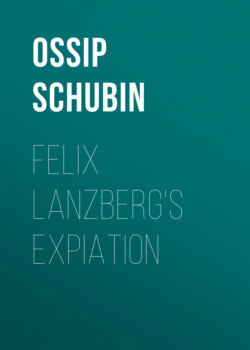Читать книгу Felix Lanzberg's Expiation - Ossip Schubin - Страница 7
На сайте Литреса книга снята с продажи.
V.
ОглавлениеTable of Contents
Susanna Blecheisen, now Mrs. Harfink, usually called Madame von Harfink, was a famous blue-stocking. As a young girl she was interested in natural sciences, studied medicine, complained of the oppression of the female sex, and wrote articles on the emancipation of woman, in which with great boldness she described marriage as an antiquated and immoral institution.
In spite of the energetic independence of her character, in her twenty-eighth year she succumbed to the magnetic attraction of a red-cheeked clerk in her father's office, and generously sacrificed for him her scorn of manly prejudice and ecclesiastical sacraments--she married him.
Hereupon she moved with her husband to Vienna, and soon enjoyed a certain fame there on account of her fine German, and because she subscribed to the Revue des Deux Mondes, and had once sat beside Humboldt at a dinner, perhaps also because her husband was a very wealthy manufacturer.
Soon convinced of the inferior intellect of this man, she did not give herself up to cowardly despair at this discovery, but did her best to educate him. She patiently read to him works on capital, during which he incessantly rattled the money in his pockets, as if he would say, How does the theoretical analysis of capital concern a practical man, as long as he relies solely upon the actual substance? This rubbish furnished occupation for poor wretches, he thought to himself, which opinion he finally announced to his wife. But when she told him that Carl Marx and Lassalle were both very wealthy men, he listened to her dissertations with considerably heightened respect. From political economy, which she treated as a light recreation, fitted to his case, she led him into the gloomy regions of German metaphysics, and plunged him confusedly into the most dangerous abysses of misused logic.
He listened calmly, without astonishment, without complaining, with the lofty conviction that to cultivate one's self, as every kind of tasty idleness, was a very noble occupation, and, like many more clever people, he made a rule of despising everything which he did not understand. Instead of any other comment, during his wife's readings he merely rubbed his hands pleasantly, and murmured as long as he was not asleep, titteringly, "This confusion, this confusion."
Yet, however Mrs. Susanna strove, his mental wings did not strengthen, and his digestion remained the most absorbing interest of his life. He always fell back again into his insignificant commonness, like a dog whom one wishes to train to walk upon two legs, but who always falls back upon four again. At an æsthetic tea, for which his wife had most conscientiously prepared him, most generously lent him her intelligence, she heard him, in the midst of a conversation upon Schopenhauer and Leopardi, say to his neighbor: "Have you a weakness for pickles, ma'am? I have a great weakness for pickles, but--he-he-he!--I--it is really very unusual--I always feel such a disagreeable prickling in my nose when I eat anything sour."
With years, Susanna somewhat neglected the difficult education of this hopeless specimen, and transferred her pedagogic capabilities to the bringing up of her son, of whom she tried to make a genius.
She designed him for jurisprudence. He, however, devoted himself to song. Instead of poring over law books in consideration of his examination, he passed two-thirds of his time at the piano, diligently trying to attain the summit of his ambition, high C, while he did not fail to twist himself into the original contortions which on such occasions all particularly ambitious but faulty voices find so effectual.
With Linda, mamma Harfink from the first could do nothing, and in consequence she sent her to a Swiss pension. There she learned, besides a little French and piano thumping, to carry her head very high, learned to go into nervous spasms over creaking boots--in a word, she acquired the refined delicacy of feeling of the "princess with the pea."
What torture when upon her return home she lay upon not a single pea, alleviated by comfortable mattresses, but upon a whole sack of undisguised peas! Her home was frightful to her. The unrestrained, coarse admiration which the young men of her circle offered her seemed unbearable to her. Discontented, weary of life, without an aim that was not bound up in vanity, she vegetated from one day to another; in desperate moments thought of going on the stage, or perpetrating some outrageous act to make herself notorious.
The only consolation of this desolate time was the intercourse with her cousin, Eugene von Rhoeden, who had been educated in the Theresanium, had learned to turn up his nose more frequently and with more fine distinction than she herself, but to her misery, had his brand new title of Freiherr, and a couple of intimate friends of very old family beside. A passionate enemy of his relatives, he had greeted her enthusiastically with the words, "Sapperment, you are wholly different from your family, Linda!"
"Do not call me Linda, that sounds so operatic," she had answered him. "My friends always called me Linn!"
Eugene Rhoeden immediately perceived that Linda had a knowledge of bon ton--evidently knew that all Austrian countesses are called Piffi, Pantschi, Nina, like grisettes or little dogs. Her romantic name was odious to her, but in a circle where the women called each other Theresa and Rosalie, she must rejoice at being named Linda and not Rosalinda.
A superficial confidence arose between her and her noble cousin.
So stood matters when Felix "accidentally" made the acquaintance of the Harfinks while walking. This was the family into which fate and his weakness had thrown him.
